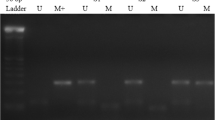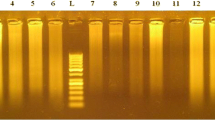Abstract
Introduction
Epigenetic gene silencing is one of the major causes of inactivation of tumor-suppressor genes in many human cancers.
Materials and methods
The aim of the present study was to determine the methylation status of the promoter region CpG islands of four cancer-related genes RASSF1A, RARβ2, CDH1, and p16 INK4a in 78 breast cancer specimens and to evaluate whether the methylation status is associated with estrogen receptor (ER), progesterone receptor (PR), and human epidermal growth factor receptor 2 (HER2/neu) together with the major clinico-pathological parameters.
Results
We showed that the methylation frequencies ranged from 19.6% (p16 INK4a) to 87% (RASSF1A) in primary breast tumors of Tunisian patients. Aberrant methylation of RARβ2 was observed in 66.6% of cases and associated with age at diagnosis (P = 0.043), while CDH1 was methylated in 47.4% of tumors and was correlated with tumor size (P = 0.013). RASSF1A presented the highest percentage of methylation (87%) and was strongly associated with poor survival (P = 0.014), with age (P = 0.048), and tumor stage (P = 0.033). Loss of ER and PR was strongly associated with GIII tumors (P = 0.000 and 0.037 respectively) while HER2/neu was associated with lymph node involvement (P = 0.026) and 5-year survival rate (P = 0.028).
Conclusions
Our preliminary findings suggested that aberrant methylation of RASSF1A and RARβ2 occurs frequently in Tunisian breast cancer patients compared with others. Furthermore, RASSF1A hypermethylation could be used as a potential marker of poor prognosis.


Similar content being viewed by others
References
Agathanggelou A, Honorio S, Macartney DP, Martinez A, Dallol A, Rader J et al (2001) Methylation associated inactivation of RASSF1A from region 3p21.3 in lung, breast and ovarian tumours. Oncogene 20:1509–1518. doi:10.1038/sj.onc.1204175
Asch BB, Barcellos-Hoff MH (2001) Epigenetics and breast cancer. J Mammary Gland Biol Neoplasia 6:151–152. doi:10.1023/A:1011306222533
Bae YK, Brown A, Garrett E, Bornman D, Fackler MJ, Sukumar S et al (2004) Hypermethylation in histologically distinct classes of breast cancer. Clin Cancer Res 10:5998–6005. doi:10.1158/1078-0432.CCR-04-0667
Bagadi SAR, Prasad CP, Kaur J, Srivastava A, Prashad R, Gupta SD et al (2008) Clinical significance of promoter hypermethylation of RASSF1A, RARβ2, BRCA1 and HOXA5 in breast cancers of Indian patients. Life Sci 82:1288–1292. doi:10.1016/j.lfs.2008.04.020
Baylin SB, Ohm JE (2006) Epigenetic gene silencing in cancer: a mechanism for early oncogenic pathway addiction. Nat Rev Cancer 6:107–116. doi:10.1038/nrc1799
Bird A (2002) DNA methylation patterns and epigenetic memory. Genes Dev 16:6–21. doi:10.1101/gad.947102
Brock MV, Gou MG, Akiyama Y, Muller A, Wu TT, Montgomery E et al (2003) Prognostic importance of promoter hypermethylation of multiple genes in esophageal adenocarcinoma. Clin Cancer Res 9:2912–2919
Byun DS, Lee MG, Chae KS, Ryu BG, Chi SG (2001) Frequent epigenetic inactivation of RASSF1A by aberrant promoter hypermethylation in human gastric adenocarcinoma. Cancer Res 61:7034–7038
Caldeira JR, Prando EC, Quevedo FC, Neto FA, Rainho CA, Rogatto SR (2006) CDH1 promoter hypermethylation and E-cadherin protein expression in infiltrating breast cancer. BMC Cancer 6:1–9. doi:10.1186/1471-2407-6-48
Dammann R, Yang G, Pfeifer GP (2001) Hypermethylation of the CpG island of Ras association domain family 1A (RASSF1A), a putative tumor suppressor gene from the 3p21.3 locus, occurs in a large percentage of human breast cancers. Cancer Res 61:3105–3109
Dreijerink K, Braga E, Kuzmin I, Geil L, Duh FM, Angeloni D et al (2001) The candidate tumor suppressor gene, RASSF1A, from human chromosome 3p21.3 is involved in kidney tumorigenesis. Proc Natl Acad Sci USA 98:7504–7509. doi:10.1073/pnas.131216298
Duffy MJ (2006) Estrogen receptors: role in breast cancer. Crit Rev Clin Lab Sci 43:325–347. doi:10.1080/10408360600739218
Elston CW, Ellis IO, Goulging H, Pindre SE (1998) Role of pathology in the prognosis and management of breast cancer. In: Elston CW, Ellis IO (eds) Systemic pathology, vol 13, 3rd edn. Churchill Livingstone, London, pp 385–433
Esteller M (2002) CpG island hypermethylation and tumor suppressor genes: a booming present, a brighter future. Oncogene 21:5427–5440. doi:10.1038/sj.onc.1205600
Esteller M, Corn PG, Baylin SB, Herman JGA (2001) Gene hypermethylation profile of human cancer. Cancer Res 61:3225–3229
Fackler MJ, McVeigh M, Evron E, Garrett E, Mehrotra J, Polyak K et al (2003) DNA methylation of RASSF1A, HIN-1, RAR-beta, Cyclin D2 and Twist in in situ and invasive lobular breast carcinoma. Int J Cancer 107:970–975. doi:10.1002/ijc.11508
Fendri A, Masmoudi A, Khabir A, Sellami-Boudawara T, Daoud J, Frikha M, Ghorbel A, Gargouri A, Mokdad-Gargouri R (2008) Inactivation of RASSF1A, RARβ2 and DAP-kinase by promoter methylation correlates with lymph node metastasis in nasopharyngeal carcinoma. Cancer Biol Ther [Epub ahead of print]
Feng W, Shen L, Wen S, Rosen DG, Jelinek J, Hu X et al (2007) Correlation between CpG methylation profiles and hormone receptor status in breast cancers. Breast Cancer Res 9:1–13. doi:10.1186/bcr1762
Feuer EJ, Wun LM, Boring CC, Flanders WD, Timmel MJ, Tong T (1993) The lifetime risk of developing breast cancer. J Natl Cancer Inst 85:892–897. doi:10.1093/jnci/85.11.892
Francis G, Beadle G, Thomas S, Mengersen K, Stein S (2006) Evaluation of estrogen and progesterone receptor status in HER-2 positive breast carcinomas and correlation with outcome. Pathology 38:391–398. doi:10.1080/00313020600922488
Hachana M, Trimeche M, Ziadi S, Amara K, Korbi S (2009) Evidence for a role of the Simian Virus 40 in human breast carcinoma. Breast Cancer Res Treat 113:43–58. doi:10.1007/s10549-008-9901-z
Herman JG, Merlo A, Mao L, Lapidus RG, Issa JP, Davidson NE et al (1995) Inactivation of the CDKN2/p16/MTS1 gene is frequently associated with aberrant DNA methylation in all common human cancers. Cancer Res 55:4525–4530
Herman JG, Graff JR, Myohanen S, Nelkin BD, Baylin SB (1996) Methylation-specific PCR: a novel PCR assay for methylation status of CpG islands. Proc Natl Acad Sci USA 93:9821–9826. doi:10.1073/pnas.93.18.9821
Issa JP (2003) Methylation and prognosis: of molecular clocks and hypermethylator phenotypes. Clin Cancer Res 9:2879–2881
Jones PA, Baylin SB (2002) The fundamental role of epigenetic events in cancer. Nat Rev Genet 3:415–428. doi:10.1038/nrg962
Lee MG, Kim HY, Byun DS, Lee SJ, Lee CH, Kim JI et al (2001) Frequent epigenetic inactivation of RASSF1A in human bladder carcinoma. Cancer Res 61:6688–6692
Lee JS, Fackler LPK, Argani MJ, Zhang P, Garrett-Mayer Z, Sukumar ES (2007) A comparative study of Korean with Caucasian breast cancer reveals frequency of methylation in multiple genes correlates with breast cancer in young, ER, PR-negative breast cancer in Korean women. Cancer Biol Ther 6:1114–1120. doi:10.1158/1535-7163.MCT-07-0002
Lehmann U, Langer F, Feist H, Glockner S, Hasemeier B, Kreipe H (2002) Quantitative assessment of promoter hypermethylation during breast cancer development. Am J Pathol 160:605–612
Li S, Rong M, Iacopetta B (2006) DNA hypermethylation in breast cancer and its association with clinicopathological features. Cancer Lett 237:272–280. doi:10.1016/j.canlet.2005.06.011
Mehrotra J, Ganpat MM, Kanaan Y, Fackler MJ, McVeigh M, Lahti-Domenici J et al (2004) Estrogen receptor/progesterone receptor negative breast cancers of young African-American women have a higher frequency of methylation of multiple genes than those of Caucasian women. Clin Cancer Res 10:2052–2057. doi:10.1158/1078-0432.CCR-03-0514
Mourali N, Muenz LR, Tabbane F, Belhassen S, Bahi J, Levine PH (1980) Epidemiologic features of rapidly progressing breast cancer in Tunisia. Cancer 46:2741–2746. doi:10.1002/1097-0142(19801215)46:12<2741::AID-CNCR2820461234>3.0.CO;2-W
Nass SJ, Herman JG, Gabrielson E, Iversen PW, Parl FF, Davidson NE et al (2000) Aberrant methylation of the estrogen receptor and E-cadherin CpG islands increases with malignant progression in human breast cancer. Cancer Res 60:4346–4348
Nielsen NH, Roos G, Emdin SO, Landberg G (2001) Methylation of the p16INK4a tumour suppressor gene: CpG island in breast cancer. Cancer Lett 163:59–69. doi:10.1016/S0304-3835(00)00674-1
Parkin DM, Ferlay J, Hamdi-Cherif M, Sitas F, Thomas J, Wabinga H et al (2003) Breast cancer in Africa: epidemiology and prevention. IARC Scientific Publication No. 153. IARC, Lyon, pp 262–267
Parrella P, Poeta ML, Gallo AP, Prencipe M, Scintu M, Apicella A et al (2004) Nonrandom distribution of aberrant promoter methylation of cancer-related genes in sporadic breast tumour. Clin Cancer Res 10:5349–5354. doi:10.1158/1078-0432.CCR-04-0555
Rusiecki JA, Holford TR, Zahm SH, Zheng T (2005) Breast cancer risk factors according to joint estrogen receptor and progesterone receptor status. Cancer Detect Prev 29:419–426. doi:10.1016/j.cdp.2005.07.004
Sambrook J, Russell DW (2001) Molecular cloning. A laboratory manual. Cold Spring Harbor Laboratory Press, Cold Spring Harbor
Sharma G, Mirza S, Prasad C, Srivastava A, Gupta SD, Ralhan R (2007) Promoter hypermethylation of p16INK4A, p14ARF, CyclinD2 and Slit2 in serum and tumor DNA from breast cancer patients. Life Sci 80:1873–1881. doi:10.1016/j.lfs.2007.02.026
Shukla S, Mirza S, Sharma G, Parshad R, Gupta SD, Ralhan R (2006) Detection of RASSF1A and RARβ: hypermethylation in serum DNA from breast cancer patients. Epigenetics 1:88–93
Sobin LH, Wittekind CH (eds) (1997) International Union Against Cancer, TNM classification of malignant tumours, 5th edn edn. Wiley-Liss, New York, pp 25–32
Sunami E, Shinozaki M, Sim MS, Nguyen SL, Vu AT, Giuliano AE, Hoon DSB (2008) Estrogen receptor and HER2/neu status affect epigenetic differences of tumor-related genes in primary breast tumors. Breast Cancer Res [Epub ahead of print]
Szyf M, Pakneshan P, Rabbani SA (2004) DNA methylation and breast cancer. Biochem Pharmacol 68:1187–1197. doi:10.1016/j.bcp.2004.04.030
Widschwendter M, Jones PA (2002) DNA methylation and breast carcinogenesis. Oncogene 21:5462–5482. doi:10.1038/sj.onc.1205606
Widschwendter M, Berger J, Hermann M, Muller HM, Amberger A, Zeschnigk M et al (2000) Methylation and silencing of the retinoic acid receptor-beta2 gene in breast cancer. J Natl Cancer Inst 29:826–832. doi:10.1093/jnci/92.10.826
Yang Q, Mori I, Shan L, Nakamura M, Nakamura Y, Utsunomiya H et al (2001) Biallelic inactivation of retinoic acid receptor b2 gene by epigenetic change in breast cancer. Am J Pathol 158:299–303
Acknowledgment
This work was supported by a grant of the Ministère de l’Enseignement Supérieur et de la Recherche Scientifique Tunisien.
Author information
Authors and Affiliations
Corresponding author
Rights and permissions
About this article
Cite this article
Karray-Chouayekh, S., Trifa, F., Khabir, A. et al. Aberrant methylation of RASSF1A is associated with poor survival in Tunisian breast cancer patients. J Cancer Res Clin Oncol 136, 203–210 (2010). https://doi.org/10.1007/s00432-009-0649-6
Received:
Accepted:
Published:
Issue Date:
DOI: https://doi.org/10.1007/s00432-009-0649-6




